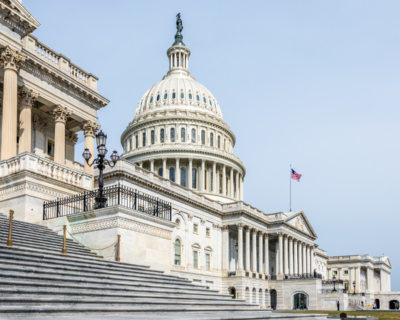Louisiana Remains on the Receiving End of Washington D.C.’s Worst Regulations
Oil drilling moratorium, union favoritism, ObamaCare mandates undercut business
 Louisiana is beset with some of the most economically damaging regulations that flow out of Washington D.C, according to industry representatives and public policy analysts. Moreover, some small business owners view local level licensing practices within their own municipalities as being overly costly and redundant.
Louisiana is beset with some of the most economically damaging regulations that flow out of Washington D.C, according to industry representatives and public policy analysts. Moreover, some small business owners view local level licensing practices within their own municipalities as being overly costly and redundant.
Anti-Energy Policies Remain in Effect
For starters, there is the moratorium on deepwater oil and gas drilling that the Obama Administration imposed in May 2010 in response to the British Petroleum oil well explosion. Although the moratorium was official lifted in October of last year, a “de-facto” moratorium remains in place, officials with the Louisiana Oil and Gas Association (LOGA), have argued.
The “political uncertainty” surrounding the Gulf region has discouraged companies from making investments that could help spur economic growth, Don Briggs, the LOGA president, has observed. As was previously reported, ten oil rigs have left the Gulf of Mexico since the moratorium went into effect and eight others that were heading into the region have been detoured away.
“When you have companies that would be spending hundreds of millions of dollars, or some cases, billions of dollars, they need certainty,” Briggs explained. “We don’t have that now and I don’t expect that we will anytime soon. We will be in a deteriorating position until this changes.”
Sen. David Vitter (R-La.) has announced that he will block the nomination of Rebecca Wodder to serve as Assistant Secretary for Fish and Wildlife Parks for the Department of Interior unless expiring Gulf drilling leases are extended for another year.
“Since the moratorium, oil and gas exploration in the Gulf of Mexico has been dramatically curtailed,” Vitter said. “In 2011 alone, more than 300 offshore drilling leases in the Gulf of Mexico are due to expire. If these leases are allowed to expire, they will revert to the federal government, killing jobs and cutting off potential revenue from exploration and production. The U.S. economy will greatly benefit by allowing the offshore energy industry to get to work and stay working.”
Earlier this year, Vitter also blocked the nomination of Dan Ashe to the Interior Department, but lifted it after new deepwater exploratory permits were issued. In addition, Vitter has successfully opposed an almost $20,000 pay raise for Interior Secretary Ken Salazar.
While Vitter’s actions have been effective, states like Louisiana that rely on cheap, affordable energy for their livelihood will most likely remain back on their heels for some time, Bonner Cohen, a senior fellow with the National Center for Public Policy Research (NCPPR), said.
“What you are seeing in Louisiana is only a small piece of larger mosaic being put together by the Obama Administration to make affordable energy as inaccessible as possible,” he observed. “From the administration’s war on coal to the serious consideration it is giving to imposing a nationwide regulation of hydraulic fracturing, to its shut down of deepwater drilling in the Gulf of Mexico, to its `endangerment finding” from the EPA [Environmental Protection Agency], the administration is practicing its own form of selected industrial sabotage.”
Although the Obama Administration failed to pass the Waxman-Markey “cap and trade” bill, it continues to pursue the same regulatory goals through the EPA and other federal agencies, Marlo Lewis, a senior fellow with the Competitive Enterprise Institute (CEI), has warned. As an alternative to pricing the carbon dioxide emissions from coal as part of a cap and trade program, the idea now is to simply prevent “conventional coal” from entering into competition with other energy sources, Lewis points out in “Green Watch,” a publication of the Capital Research Center (CRC.)
“Obama’s target is virtually identical to the mix of electricity fuels that would develop under Waxman-Markey,” Lewis explains. “Under Obama’s proposal, 80% of U.S. electricity would come from nuclear, natural gas, CCS, and renewable energy by 2035. Under Waxman-Markey, an estimated 81% would come from the same sources by 2030, according to the U.S. Energy Information Administration (EIA).”
The EPA also issued an “Endangerment Rule” back in Dec. 2009 that could have far reaching consequences for Louisiana businesses and average citizens. The rule claims that the “elevated concentration” of GHG (Greenhouse) emissions in the atmosphere “endangers public health and welfare.” This could create an enormous opening for additional regulatory mischief by misapplying and misusing the Clean Air Act (CAA), which makes no mention of “greenhouse gas” or the “greenhouse effect,” Lewis notes.
“If the Obama Administration is really were to impose the EPA’s Endangerment Rule on the nation, than the Clean Air Act could be transformed into a law that requires the United States to de-industrialize itself,” Lewis laments.
But the EPA insists it has the authority to implement new regulatory rules under the CAA under the U.S. Supreme Court’s Massachusetts v. EPA ruling in 2007. The court concluded that carbon dioxide (CO2) was an air pollutant as the term is defined within the parameters of the CAA.
Team Obama Advances Big Labor Agenda
The EPA has a long track record of anti-business activity that is well documented and not likely to change anytime soon Mike Mitternight, the president of the Factory Service Agency, an air conditioning service and installation company based in Jefferson Parish, observed. But he is equally concerned with the “pro-union” leanings of the National Labor Relations Board (NLRB).
“We always need to be concerned about the EPA,” he said. “Businesses have historically done battle with the EPA. But right now I’m looking over my shoulder at what the NLRB is doing. The pro-unionization rulings are something we need to keep our eye on.”
Mitternight is particularly concerned about a proposal to curtain the amount of time set aside for unionization elections involving private companies. If the rule change goes into effect, the NLRB would set elections from a current median time of 37 days to as little as 10 days from the filing of an election petition. They would also set pre-election hearings for 7 days after a petition is filed; the rules would also require the employer to respond to a pre-hearing questionnaire raising any legal issues or waive its right to do so. And finally, the new rules would defer a decision on the issues raised at the hearing till after the election, putting an employer at risk if the decision is challenged.
“From the point of view of small business, this is very problematic,” Mitternight said. “It means a union could break our employees out into small groups and attempt to unionize in a piecemeal fashion.”
Mitternight also expressed concern over the “repetitive nature” of the licensing policies in Louisiana municipalities that translate into multiple fees and taxes. The total sales tax is 9 percent in Orleans Parish and 8.75 percent in Jefferson. Therefore, if he makes a purchase in Jefferson Parish and pays the 8.75% and then subsequently installs equipment in New Orleans Parish, he must then pay the 1/4 percent difference as a use tax for installation in Orleans.
Mitternight holds an occupational license in Jefferson Parish but must also maintain an occupational license in Orleans Parish, which is used to collect the additional ¼ percent tax. In addition, he holds a statewide Mechanical Contractors license, but is also required to have both a mechanical and a gas fitters license in Jefferson, Orleans, Kenner, Plaquemines, St. Tammany, Slidell, Mandeville, St. Bernard, and any other similar municipality or Parish where he operates.
“I have to fill out the tax report form on a monthly basis and indicate where I made an installation in New Orleans and pay them the extra tax,” he said. “It can be an expensive proposition to be an air conditioning manufacturer because you have this multi-layered licensing and I see it as an over-regulation.”
ObamaCare Could Force New Bureaucracies, Higher Costs
Unless the U.S. Supreme Court intervenes and rules in favor of the lawsuits that challenge the constitutionally of President Obama’s new health care law, Louisiana and other states will be forced to accommodate new layers of bureaucracy and higher costs, a report from the American Legislative Exchange Council shows.
“ObamaCare’s Medicaid mandates will bring significant fiscal damage to already strained state budgets, especially when taking into consideration the amount states currently spend on Medicaid” the report warns. Louisiana’s own Department of Health and Hospitals has produced a study that shows implementation of ObamaCare will cost the state in excess of $7 billion over a 10 year period.
Rep. John Fleming (R-La.), who is also a medical doctor, points out that the “governmentalization” of health care has been in motion since the 1960s. The Patient Protection and Affordable Care Act (PPCA), the official title of ObamaCare, accelerates a harmful trend that must be reversed, he said.
“These policies are separating the patient from the private sector by inserting government with all its bureaucracy, additional costs and regulations,” he observed. “ObamaCare just makes this worse.”
Rep. Fleming has offered up two proposals, which would help to expand choice, lower costs and expand the influence of the private sector. Policymakers should “open up state lines” so that insurance companies must compete with one another and consumers can choose the best plan for their needs, he said. Fleming also supports the expansion of Health Savings Accounts (HSAs). They come with higher deductibles, but this also creates an incentive to save and to make “wise purchases,” he said.
Fleming added:
“This is about putting consumers back in charge. Often times, we see them saving over and above what their deductible is in their Health Savings Accounts. ”
Louisiana is a plaintiff in the multi-state lawsuit that has been filed against ObamaCare.
Kevin Mooney is an investigative reporter with the Pelican Institute for Public Policy. He can be reached at kmooney@pelicanpolicy.org and you can follow him on Twitter.




